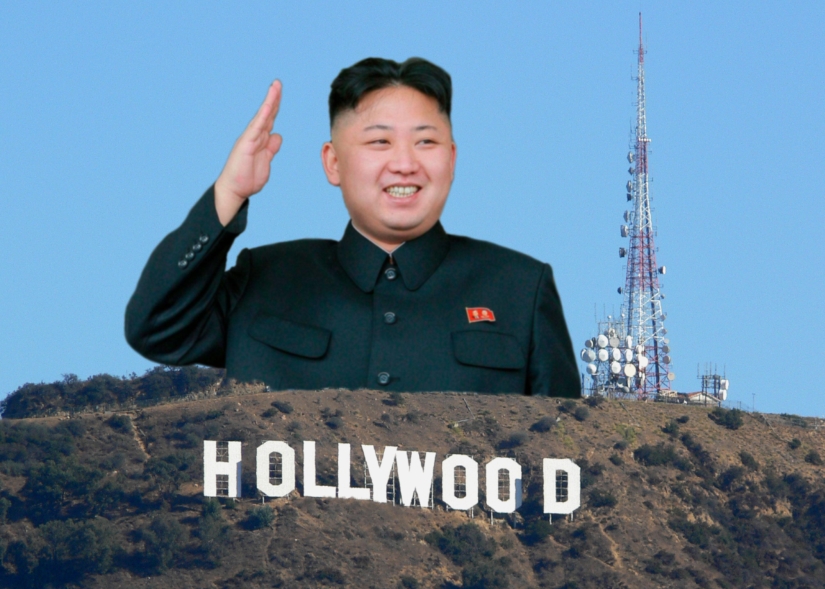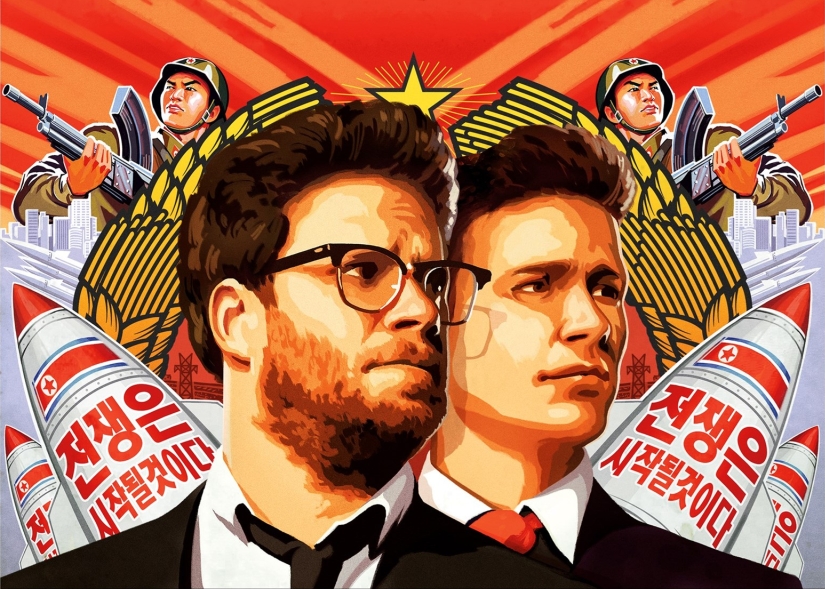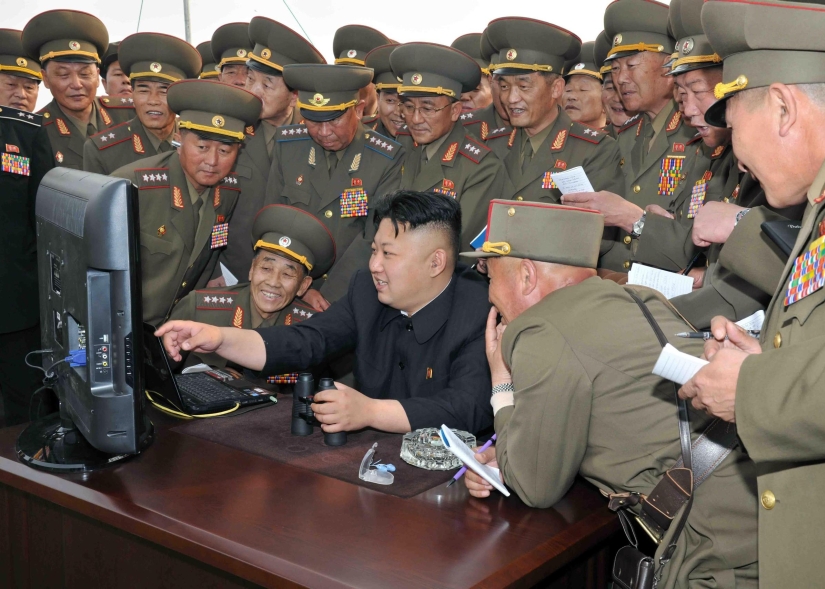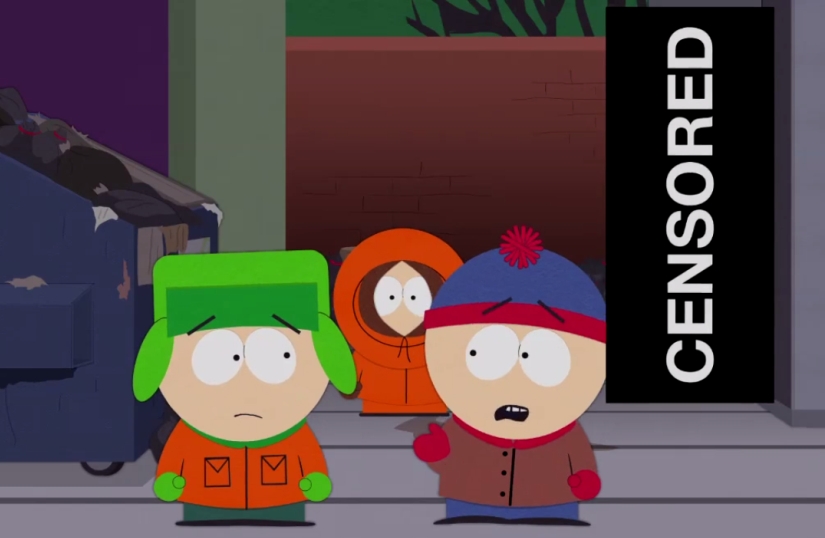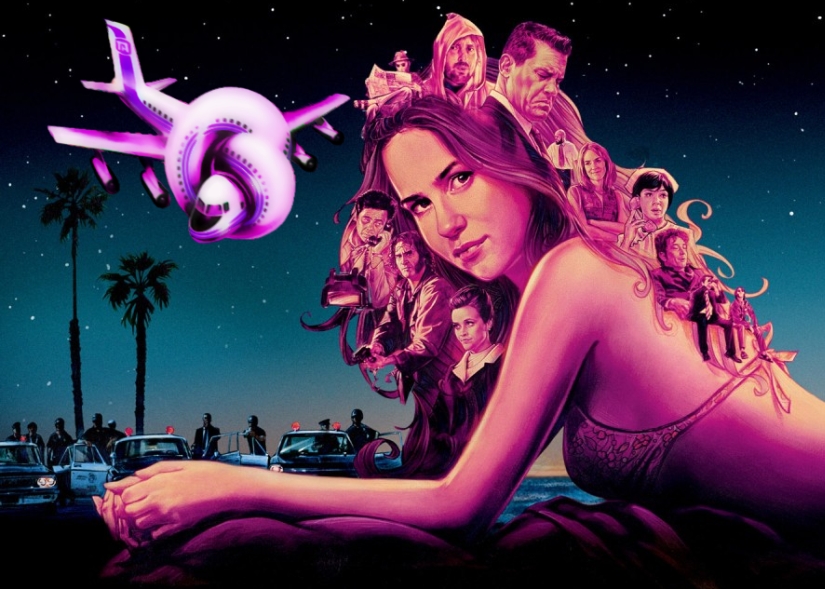The Canceled Interview: Sony Bows to Hackers, North Korea Wins, and No One is Laughing
In an alternate universe, The Interview was released on Christmas to so-so reviews and modest business; it was beaten on opening weekend by Into the Woods. After four days of post-release thinkpieces and three weeks of diminishing box office returns, The Interview was forgotten.
But we live in a strange world and interesting times.
The Interview was a disposable dude-bro movie that would have had as much cultural impact as a fart in an empty elevator. But because of the hacks linked to North Korea and threats of 9/11-style violence against movie theaters, Sony canceled the movie's release, which includes DVD/Blu-ray and VOD. The Interview is now much more. It's an emblem of Kim Jong-Un's bizarre victory, and a freak American symbol for freedom of expression and corporate cowardice. But more than that, The Interview has also offered us a frightening glimpse into the potential power of cyberterrorism.
Movies have lampooned actual and fictional world leaders before, like Kim Jong-Il in Trey Parker and Matt Stone's Team America: World Police, Charlie Chaplin's obvious Hitler analog in The Great Dictator, and the Gaddafi-like tyrant played by Sacha Baron Cohen in The Dictator. The Zucker-Abrahams-Zucker comedy team opened The Naked Gun with Frank Drebin beating up Idi Amin and Ayatollah Khomeini, among others; Abrahams would go on to target Saddam Hussein in the two Hot Shots! films—say what you will about Hot Shots! Part Deux, but Saddam is the highlight of that movie.
People have also attempted to use their power to block the release of movies. Most notably, William Randolph Hearst tried to bury Citizen Kane when he learned that he was a primary influence for the character Charles Foster Kane. Hearst refused to run ads for the film in his newspapers, used his publications to question Welles' patriotism, and exploited connections in Hollywood to block theaters from showing Citizen Kane. Studio execs sympathetic to Hearst and led by MGM's Louis B. Mayer even offered to buy all prints and negatives of Citizen Kane in order to burn them.
Which is what makes this situation more absurd. The Interview—a movie that is likely mediocre-at-best if these reviews compiled at Criticwire are any indication—is now a symbol, and it's been elevated (for now) to share an odd cultural conversation space alongside Citizen Kane and The Great Dictator. There are thinkpieces all over the internet (like this one) about the movie as a moment signifying something important rather than a mere vehicle for Seth Rogen and James Franco to make dick jokes. On IMDB, The Interview has a 9.9/10 as a purely symbolic gesture, one that makes it a better-rated movie than Citizen Kane and The Great Dictator. As Alec Kubas-Meyer joked over at Flixist, "Couldn't the terrorists have chosen a more meaningful film?"
For the first time, a foreign power has dictated what Americans can watch on their own home soil, and simply because Kim Jong-Un finds something offensive. (Let's temporarily shelve the conversation about good taste, bad taste, propriety, and their relation to comedy for another day.) And to think that the cyberattack was ordered by North Korea of all places. Reports last night suggest that the actual hackers, the "Guardians of Peace," are based in countries around the globe, though likely working with Bureau 121, North Korea's government-sponsored cyber warfare unit. Whatever the arrangement, North Korea and the hackers are preying on raw American fear, and succeeding.
There's the threat of a terrorist attack on movie theaters. Nevermind that these threats aren't credible, and nevermind that these threats are unfeasible. Picture not a full-scale invasion like the remake of Red Dawn, but rather 9/11, and the Boston Marathon bombing, and the theater in Aurora, Colorado where James Eagan Holmes opened fire on the audience during The Dark Knight Rises; and tied up in the last example are Newtown, and Virginia Tech, and Elliot Rodger, and Fort Hood, and Columbine, and other mass shootings.
Far more important than the gossip of the leaked Sony emails is a genuine worry that everything is monitored and nothing is safe. This feeling is bolstered by the celebrity phone hacks, the Target credit card breach, and the revelations of Edward Snowden. Thousands of Sony employees have had their social security numbers, medical information, correspondence, and other personal info released. Who's to say anyone's safe, in person or online?
(This may also reveal Sony's own ineptitude. Perhaps the company learned nothing from the 2011 PlayStation Network hack.)
Ty Burr at The Boston Globe worried about the precedent that these events have set. He wrote, "Sony and the major exhibition chains have opened the door for any zealot or teenage hacker with mad skills to make all the threats and mayhem they want. This will not be the last such event." Already, the fear that prompted the cancellation of The Interview has claimed other victims. New Regency was adapting Guy Delisle's graphic novel Pyongyang into a film directed by Gore Verbinski and starring Steve Carrell. The film was canceled just the other day.
The Alamo Drafthouse and a number of other theaters planned to screen Team America in lieu of The Interview—a symbolic middle finger to North Korea accompanied by a hearty "Fuck yeah!" Paramount, the distributor of Team America, promptly banned the screenings from happening. Not only is a foreign power dictating what Americans can see on their home soil, the fear of reprisal by that foreign power is also dictating the kinds of films and symbolic gestures that Americans think they can make.
We should have the option to laugh about a tense and absurd situation like this because laughter is a form of release, and maybe a helpful one—like George Saunders wrote, humor is often "what happens when we're told the truth quicker and more directly than we're used to"—but we've been rendered humorless from abroad. This sort of reminds me of that "Imaginationland" three-parter on South Park where terrorists attack our imagination. Certainly people's imaginations are being turned against them to fear the worst, and in a sense the Guardians of Peace have also exploited America's failures of imagination with regard to cyberterrorism. The end result, at least immediately, is panic about our vulnerability and an uncertainty about our ability to act and how to act.
There's another South Park multi-parter to consider: "200" and "201." Parker and Stone caught flack for daring to depict Muhammad on screen. A small radical group called Revolution Muslim threatened Parker and Stone prior to the airing of "201." Revolution Muslim stated that the South Park creators might face violent retribution for their work, possibly murder like Dutch filmmaker Theo van Gogh. (Van Gogh was killed by a Muslim extremist because of Submission, a short film about violence against women in the Islamic world. Van Gogh's last completed film was 06/05, a fictional retelling of the assassination of Pim Fortuyn, a Dutch politician.)
Panic was high at the time, security was beefed up around Comedy Central offices, but they wound up airing "201," albeit heavily censored when broadcast. You can find the full script of "201" online as well an uncensored version of the episode. The moral the boys learn goes like this:
Kyle: You see, I learned something today. Throughout this whole ordeal, we've all wanted to show things that we weren't allowed to show. But it wasn't because of some magic goo. It was because of the magical power of threatening people with violence. That's obviously the only true power. If there's anything we've all learned, it's that terrorizing people works.
Jesus: That's right. Don't you see, gingers? If you don't want to be made fun of anymore, all you need are guns and bombs to get people to stop.
Santa: That's right, friends. All you need to do is instill fear and be willing to hurt people and you can get whatever you want. The only true power is violence.
It's funny because it's true.
Inherent Vice is like Airplane? Surely You Can't Be Serious
The first hints of what Inherent Vice was like came in July. Paul Thomas Anderson screened his new movie months early for select writers and industry people, and word got out about what they saw. Various impressions were compiled by Kevin Jagerrnauth over at The Playlist, including the following insider assessment: "It's BONKERS—weird, weird, weird. It made me laugh out loud several times, but not in the ways you might expect. The humor is not so much Boogie Nights, as I think a lot of people are expecting. For reals, it tips into, like, Zucker Bros.-level gags and broad humor. But, obviously, mixed with his other sensibilities. Strange, beguiling tone." (The Big Lebowski and The Long Goodbye were mentioned as well, which makes sense for an LA noir story about a stoner private detective made by an unabashed Robert Altman fan.)
When I reviewed Inherent Vice at Unseen Films during the New York Film Festival (NYFF), I mentioned seeing Anderson in conversation with festival director Kent Jones. Anderson showed clips of work that informed his approach to Inherent Vice. He opened with Police Squad!, the short-lived 1982 show by Jim Abrahams, David Zucker, and Jerry Zucker that would spawn The Naked Gun series. Zucker-Abrahams-Zucker were also responsible for the oddball cult comedy The Kentucky Fried Movie and the classic spoofs Airplane! and Top Secret!. Anderson said that he didn't try to redo Police Squad! with Inherent Vice, but he found the spirit of the work both liberating and encouraging as he was beginning the project. It makes sense to look to madcap comedy when tackling a Thomas Pynchon novel—he can be complicated, but he's often funny and always entertaining.
[youtube id="ixljWVyPby0" align="center" autoplay="no" maxwidth="829"]
A number of reviews of Inherent Vice have said the film is like a Zucker-Abrahams-Zucker movie.
But it's really not.
There's a difference between influence and likeness, and some of the comparisons with Zucker-Abrahams-Zucker are grossly overstated. Inherent Vice is its own animal that moves at its own pace and with its own rhythm, and not necessarily the rhythm I get when reading Pynchon.
Watch a clip from Airplane! or The Naked Gun and you're getting a gag every 10 seconds, if not faster, and often more than one gag. Coming at all angles and different levels,the best Zucker-Abrahams-Zucker comedy is a meticulously crafted gag machine. One scene may be a reference to another film or a genre trope, and if the reference isn't funny on its own, there's usually wordplay and snappy verbal exchanges, and if that's not enough, there's usually a sight gag somewhere in the frame that winds up being funny; and if none of that was funny, it's on to the next gag as if the previous one didn't bomb. The zaniness is built on a blend of perfect timing and seemingly reckless velocity.
[youtube id="UbyrQFgRuHA" align="center" autoplay="no" maxwidth="829"]
Inherent Vice, by comparison, doesn't have the gag-every-10-seconds aesthetic. The trailers, maybe, but not the film itself, with its long takes and whispery dialogue, and wigged-out vibe rather than outright zaniness. It's a different kind of movie with a different kind of sensibility—paranoia rather than anarchy, and disillusionment rather than playfulness, which figures for a movie about the children of the 1960s realizing that they blew it and that the battle for the American soul was already lost.
To put it another way, if Zucker-Abrahams-Zucker is the comedy equivalent of Cliff Friend and Dave Franklin's "The Merry-Go-Round Broke Down" and Raymond Scott's "Powerhouse", Anderson's Inherent Vice is like Can's "Vitamin C" and Neil Young's "Journey Through the Past." (Both are on the film's soundtrack. More on Young a bit later.)
Police Squad! may have given Anderson the initial push, but Anderson is definitely the person pedaling the bike, which is why Inherent Vice has much more in common with The Master than The Naked Gun. While the fall of the counterculture is at the heart of Inherent Vice, Anderson uses the novel as a way to continue his exploration of relationships between men in opposition, sometimes diametrically. It was Daniel Plainview and Eli Sunday in There Will Be Blood, and it was Freddie Quell and Lancaster Dodd in The Master. Here it's hippie-dippie Doc Sportello (Joaquin Phoenix) and straight-edged Bigfoot Bjornsen (Josh Brolin), and it's also the hopey-dopey 1960s vs. the disillusionment of 1970s.
Part of the overstatement of the Zucker-Abrahams-Zucker influence is the parroting that people do when they hear an informed opinion. We've all at one time or another taken received perceptions as our own without actually processing them, and that may be at play here. Yet I think a larger part of the overstatement has to do with the need to find familiar footholds in a work that, like the insider mentioned at the beginning, is strange and beguiling in tone.
Anderson's combined a number of influences in the film; other clips shown during the NYFF conversation included Alex Cox's The Repo Man, Neil Young's Journey Through the Past, Alfred Hitchcock's North by Northwest, Quentin Tarantino's Jackie Brown, and the music video for "Oblivion" by Grimes directed by Emily Kai Bock. Different sources, different tones, and different ways for Anderson to get in the groove to make his movie, but it's purposeful: even though Inherent Vice isn't Pynchon's most difficult novel, it takes footholds in the familiar to explore seemingly unfamiliar territory like the writing of Thomas Pynchon.
And maybe that's why I get a different vibe when I read Pynchon than what Anderson gives in his adaptation (which is missing all of Pynchon's fake surf rock songs, sadly). When I read Pynchon, I usually think of The Marx Brothers and their zany, breakneck pace, but filtered through a mind obsessed with grand conspiracies, forces of opposition, the unending conflict between the preterite (the common folk) and the elect (the elite), and how to negotiate this world with that sort of worldview. Anderson gets a lot of that too, but to adapt is to give one's own take on something, and Anderson's take is filtered through his footholds and his obsessions. If it takes familiar footholds to explore the seemingly unfamiliar, it might take personal obsessions to adapt and reinterpret the work of an obsessive.
[youtube id="73oO2XA_ihk" align="center" autoplay="no" maxwidth="829"]
So rather than Zucker-Abrahams-Zucker comparisons, the real heart of Inherent Vice may be Young's wayward 1972 film Journey Through the Past, and perhaps Young's dark phase with "The Ditch Trilogy." Anderson showed a clip from Journey in which Young drives his vintage car into the woods, gets out, smokes a joint with his girlfriend, eats some strawberries, mumbles something, and then they get back in and drive off. It's a long single-take, a sunny day; it's a simpler time, and sort of beautiful because it's so worry-free and purpose-free. There's a scene in Inherent Vice over which Young's song "Journey Through the Past" plays, and it's one of the most memorable and moving parts of the movie, because it's about a simpler time, worry-free and purpose-forgotten, and there's just that residual love of the missing past before the future came and screwed everything up. In the past, an open lot, a dream; in the present, the dream's been replaced by the most vulgar kind of progress—a skyscraper.
While Pynchon's fake songs aren't present in Inherent Vice, Anderson brings two Neil Young songs that suit his sensibilities as a filmmaker, and that suit the film's overall sensibility. I've written that the Anderson who made Magnolia probably would have made a more Pynchon-esque film than the Anderson who made The Master, and while I still think that (and that Magnolia feels more Pynchon-esque to me than Inherent Vice), I have to admit that the old Anderson isn't the man in the present. And I should be groovy with that.
I want to rewatch Inherent Vice and listen to Neil Young's output during the first half of the 1970s, because that may be one of the ideal footholds into this film, and while Young's music may not be in the novel Inherent Vice, there are shared sensibilities in scope. The disillusionment with the 60s was there in 1972's Harvest ("The Needle and the Damage Done" was written for Danny Whitten of Crazy Horse after he died of an overdose). From "The Ditch Trilogy," the albums are titled Time Fades Away, On the Beach, and Tonight's the Night. Those titles taken together seem to hint at the shape of Inherent Vice with regard to the movement of time, and while the Pynchon in my head plays differently, Anderson's covering Pynchon in the style of Neil Young (among others), which is probably just the way it sounds in his head.

